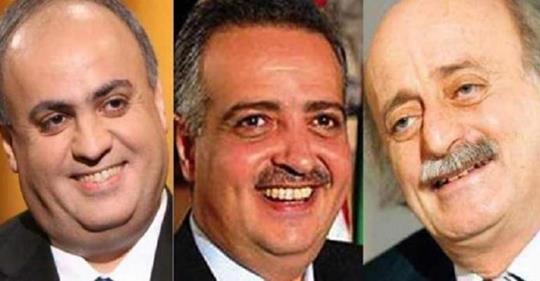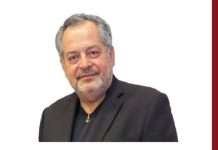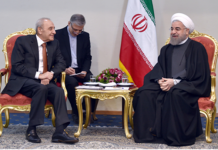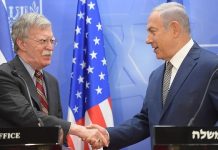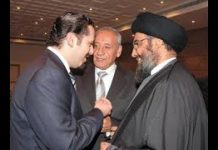Analysis/Echoes of Deadly ISIS Bombing on Syrian Druze Reverberate in Lebanon
زفي بارئيل من الهآررتس: ترددات مجازر داعش في السويداء السورية ضد الدروز تجد صداها في لبنان
Zvi Bar’el/Haaretz/July 30/18
The Druze in Syria are frustrated with Russia and Assad, who stripped them of their weapons in return for protection, and Lebanese Druze politicians use this storm for their benefit
The shock waves from the Islamic State massacre in the heavily Druze city of Sweida on Wednesday that left more than 260 people dead reached Israel, where thousands of Druze demonstrated in protest, and Lebanon, where more than 300,000 Druze live.
This is probably the worst event to hit the Druze community in general, and in Syria in particular, since the Syrian civil war began.
The deep tragedy was compounded by the deep frustration with Russia, which had promised to protect the Druze community of around 800,000 in Syria and did not keep its commitment. The Druze are also disappointed with the Syrian military, with which Sweida’s Druze had come to an understanding on cooperation that included the return of weapons, enlisting Druze militiamen to the army and even allowing young Druze to start enlisting. Not all of Sweida’s residents supported these agreements, which were made with the sect’s spiritual leaders in the city.
But the recognition that Bashar Assad would remain at the country’s helm after the war and the desire to protect themselves and their properties led them to give the Russians and Syrians what they wanted – namely, that the Druze wouldn’t stand in the way of the
But following the massacre an internal dispute erupted in Sweida as to whether their leadership acted correctly when they agreed to sit quietly, dismantle the militias and hand over their weapons to the regime.
In Sweida, the heavy mourning is blocking any response for now. In Lebanon, however, there has been a political storm over the political exploitation of the bloodbath. The spark was lit by Druze political leader Walid Jumblatt, who heads the Progressive Socialist party, who in a speech made at a rally in memory of those murdered blamed the Syrian regime for the massacre.
“Assad wants to forcefully defeat the mountain people [the Druze]. We have understandings with the Russians but we demand guarantees for the safety of the Druze,” he said, ending his address with a controversial declaration. “If only I had a weapon, I would go out to fight alongside the mountain people.” No one could mistake Jumblatt’s political intentions. Not only did he blame Assad and the Syrian regime, but there was more than a hint in his remarks that the Syrian Druze had made an error when they gave up their weapons and made a faulty agreement with the Russians.
The rally, which was meant to display solidarity with the Syrian Druze, immediately turned into a political rally that demanded a response from Jumblatt’s political rivals. Wiam Wahhab, leader of the Druze Arab Unity party, explained that “Jumblatt finds himself in great distress because he bet on Assad’s downfall and he is frustrated by the United States’ backtracking.” He called on Sweida’s residents to “Organize. Weapons are available and if necessary we are prepared to come to you and fight alongside you.”
However, his remarks were less intended for Sweida’s residents than as an effort to deprive Jumblatt of the monopoly on determining the Lebanese Druze position.
The leader of the Druze Democratic Party in Lebanon, Talal Arslan, preferred to accuse Israel of being behind the massacre, along with the United States. Arslan, who has political and personal animosity toward Jumblatt, blames Jumblatt for the difficult situation of the Druze in Lebanon, whom he says suffer from abject poverty, unemployment, school dropouts and drug abuse because Jumblatt hasn’t been able to exploit his position to obtain funds for the community.
But the public struggle between the leaders, complete with insults and offensive remarks, is not necessarily only about the welfare of the Druze. Jumblatt is an ally of Said al-Hariri, the prime minister who has been trying unsuccessfully to form a government for more than two months. Arslan, on the other hand, is considered an ally of President Michel Aoun and intends to form a political bloc with the Free Patriotic Movement, a Christian party founded by Aoun and now headed by Gebran Bassil.
Wiham Wahhab is close to Hassan Nasrallah and his party is Hezbollah’s ally. The two Druze parties, headed by Wahhab and Arslan, supported and still support the Assad regime, as opposed to Jumblatt’s party. The pro-Assad Druze parties are looking forward to the end of the war so they can sign new cooperation agreements with Assad. Naturally, the leaders of these two parties refrained from accusing Assad of responsibility for the massacre in Sweida and are calling on Syria’s Druze not to fall into the trap that Jumblatt is preparing for them, since Jumblatt, they say, is operating in accordance with foreign agendas — hinting at his ties with the United States.
The controversy and political confrontations in the Lebanese arena sparked by the massacre will have implications not only for the composition of the Lebanese government, but also for Lebanon’s policy towards Syria. Although the Druze have a small representation in the parliament, only eight seats of 128, this is enough to tip the balance during the creation of the political blocs that will get government portfolios.
It is these blocs that will have to decide on the nature of relations with Syria, determine the extent of the prime minister’s powers and whether to challenge or assist the political bloc of Hezbollah. The delicate balance of political power in Lebanon depends not only on victory in the polls, but also on the personal relationships between leaders and the connections they have with countries in the region like Saudi Arabia, Iran, the United Arab Emirates and Qatar.
In all these countries the Druze are expected to have their say, and as the Lebanese journalist Mirez Rizk wrote in Al-Akhbar, “The pregnancy began in Sweida, but the birth will be in Lebanon.”

















